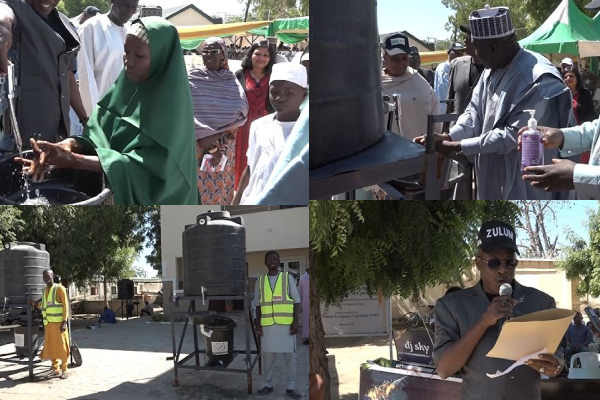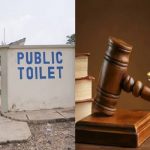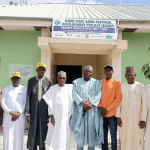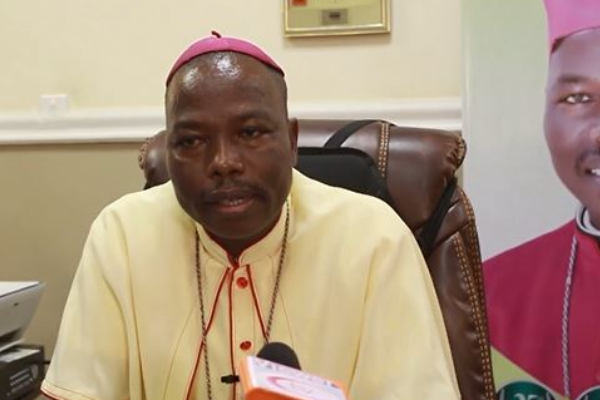The Borno state government has earmarked 8.2 billion naira for the provision of water, sanitation and hygiene (WASH) facilities across the twenty seven local government councils of the state.
This the government believes, would go a long way in containing spread of infectious diseases.
There has been recent resurgence of viral diseases across the country.
[wonderplugin_video iframe=”https://youtu.be/qkLV13kCqZc” lightbox=0 lightboxsize=1 lightboxwidth=960 lightboxheight=540 autoopen=0 autoopendelay=0 autoclose=0 lightboxtitle=”” lightboxgroup=”” lightboxshownavigation=0 showimage=”” lightboxoptions=”” videowidth=600 videoheight=400 keepaspectratio=1 autoplay=0 loop=0 videocss=”position:relative;display:block;background-color:#000;overflow:hidden;max-width:100%;margin:0 auto;” playbutton=”https://www.tvcnews.tv/wp-content/plugins/wonderplugin-video-embed/engine/playvideo-64-64-0.png”]
Experts have revealed that some easy ways of contacting such viruses include breathing in air-borne droplets contaminated with virus and open dedication.
Government at all levels are stepping up measures to ensure that the citizens are protected from contacting such diseases.
Borno state environmental protection agency revealed that 16% of the total population of the state still practice open defecation.
But government is working round the click to end the menace by the year 2030.
The WASH project facilities to be provided include six mini-water works, 10 earth dams for water supply and irrigation, as well as the construction of dozens of toilets at public places.
General Manager of the State’s Rural Water Supply and Sanitation Agency (RUWASSA), Dr. Ali Musa, disclosed this, in Maiduguri to mark 2022 World Toilet Day.
According to him, many electricity-powered boreholes will be converted to solar-driven boreholes.
The Borno state government has earmarked 8.2 billion naira for the provision of water, sanitation and hygiene (WASH) facilities across the twenty seven local government councils of the state.
This the government believes, would go a long way in containing spread of infectious diseases.
There has been recent resurgence of viral diseases across the country.
[wonderplugin_video iframe=”https://youtu.be/qkLV13kCqZc” lightbox=0 lightboxsize=1 lightboxwidth=960 lightboxheight=540 autoopen=0 autoopendelay=0 autoclose=0 lightboxtitle=”” lightboxgroup=”” lightboxshownavigation=0 showimage=”” lightboxoptions=”” videowidth=600 videoheight=400 keepaspectratio=1 autoplay=0 loop=0 videocss=”position:relative;display:block;background-color:#000;overflow:hidden;max-width:100%;margin:0 auto;” playbutton=”https://www.tvcnews.tv/wp-content/plugins/wonderplugin-video-embed/engine/playvideo-64-64-0.png”]
Experts have revealed that some easy ways of contacting such viruses include breathing in air-borne droplets contaminated with virus and open dedication.
Government at all levels are stepping up measures to ensure that the citizens are protected from contacting such diseases.
Borno state environmental protection agency revealed that 16% of the total population of the state still practice open defecation.
But government is working round the click to end the menace by the year 2030.
The WASH project facilities to be provided include six mini-water works, 10 earth dams for water supply and irrigation, as well as the construction of dozens of toilets at public places.
General Manager of the State’s Rural Water Supply and Sanitation Agency (RUWASSA), Dr. Ali Musa, disclosed this, in Maiduguri to mark 2022 World Toilet Day.
According to him, many electricity-powered boreholes will be converted to solar-driven boreholes.
The Borno state government has earmarked 8.2 billion naira for the provision of water, sanitation and hygiene (WASH) facilities across the twenty seven local government councils of the state.
This the government believes, would go a long way in containing spread of infectious diseases.
There has been recent resurgence of viral diseases across the country.
[wonderplugin_video iframe=”https://youtu.be/qkLV13kCqZc” lightbox=0 lightboxsize=1 lightboxwidth=960 lightboxheight=540 autoopen=0 autoopendelay=0 autoclose=0 lightboxtitle=”” lightboxgroup=”” lightboxshownavigation=0 showimage=”” lightboxoptions=”” videowidth=600 videoheight=400 keepaspectratio=1 autoplay=0 loop=0 videocss=”position:relative;display:block;background-color:#000;overflow:hidden;max-width:100%;margin:0 auto;” playbutton=”https://www.tvcnews.tv/wp-content/plugins/wonderplugin-video-embed/engine/playvideo-64-64-0.png”]
Experts have revealed that some easy ways of contacting such viruses include breathing in air-borne droplets contaminated with virus and open dedication.
Government at all levels are stepping up measures to ensure that the citizens are protected from contacting such diseases.
Borno state environmental protection agency revealed that 16% of the total population of the state still practice open defecation.
But government is working round the click to end the menace by the year 2030.
The WASH project facilities to be provided include six mini-water works, 10 earth dams for water supply and irrigation, as well as the construction of dozens of toilets at public places.
General Manager of the State’s Rural Water Supply and Sanitation Agency (RUWASSA), Dr. Ali Musa, disclosed this, in Maiduguri to mark 2022 World Toilet Day.
According to him, many electricity-powered boreholes will be converted to solar-driven boreholes.
The Borno state government has earmarked 8.2 billion naira for the provision of water, sanitation and hygiene (WASH) facilities across the twenty seven local government councils of the state.
This the government believes, would go a long way in containing spread of infectious diseases.
There has been recent resurgence of viral diseases across the country.
[wonderplugin_video iframe=”https://youtu.be/qkLV13kCqZc” lightbox=0 lightboxsize=1 lightboxwidth=960 lightboxheight=540 autoopen=0 autoopendelay=0 autoclose=0 lightboxtitle=”” lightboxgroup=”” lightboxshownavigation=0 showimage=”” lightboxoptions=”” videowidth=600 videoheight=400 keepaspectratio=1 autoplay=0 loop=0 videocss=”position:relative;display:block;background-color:#000;overflow:hidden;max-width:100%;margin:0 auto;” playbutton=”https://www.tvcnews.tv/wp-content/plugins/wonderplugin-video-embed/engine/playvideo-64-64-0.png”]
Experts have revealed that some easy ways of contacting such viruses include breathing in air-borne droplets contaminated with virus and open dedication.
Government at all levels are stepping up measures to ensure that the citizens are protected from contacting such diseases.
Borno state environmental protection agency revealed that 16% of the total population of the state still practice open defecation.
But government is working round the click to end the menace by the year 2030.
The WASH project facilities to be provided include six mini-water works, 10 earth dams for water supply and irrigation, as well as the construction of dozens of toilets at public places.
General Manager of the State’s Rural Water Supply and Sanitation Agency (RUWASSA), Dr. Ali Musa, disclosed this, in Maiduguri to mark 2022 World Toilet Day.
According to him, many electricity-powered boreholes will be converted to solar-driven boreholes.
The Borno state government has earmarked 8.2 billion naira for the provision of water, sanitation and hygiene (WASH) facilities across the twenty seven local government councils of the state.
This the government believes, would go a long way in containing spread of infectious diseases.
There has been recent resurgence of viral diseases across the country.
[wonderplugin_video iframe=”https://youtu.be/qkLV13kCqZc” lightbox=0 lightboxsize=1 lightboxwidth=960 lightboxheight=540 autoopen=0 autoopendelay=0 autoclose=0 lightboxtitle=”” lightboxgroup=”” lightboxshownavigation=0 showimage=”” lightboxoptions=”” videowidth=600 videoheight=400 keepaspectratio=1 autoplay=0 loop=0 videocss=”position:relative;display:block;background-color:#000;overflow:hidden;max-width:100%;margin:0 auto;” playbutton=”https://www.tvcnews.tv/wp-content/plugins/wonderplugin-video-embed/engine/playvideo-64-64-0.png”]
Experts have revealed that some easy ways of contacting such viruses include breathing in air-borne droplets contaminated with virus and open dedication.
Government at all levels are stepping up measures to ensure that the citizens are protected from contacting such diseases.
Borno state environmental protection agency revealed that 16% of the total population of the state still practice open defecation.
But government is working round the click to end the menace by the year 2030.
The WASH project facilities to be provided include six mini-water works, 10 earth dams for water supply and irrigation, as well as the construction of dozens of toilets at public places.
General Manager of the State’s Rural Water Supply and Sanitation Agency (RUWASSA), Dr. Ali Musa, disclosed this, in Maiduguri to mark 2022 World Toilet Day.
According to him, many electricity-powered boreholes will be converted to solar-driven boreholes.
The Borno state government has earmarked 8.2 billion naira for the provision of water, sanitation and hygiene (WASH) facilities across the twenty seven local government councils of the state.
This the government believes, would go a long way in containing spread of infectious diseases.
There has been recent resurgence of viral diseases across the country.
[wonderplugin_video iframe=”https://youtu.be/qkLV13kCqZc” lightbox=0 lightboxsize=1 lightboxwidth=960 lightboxheight=540 autoopen=0 autoopendelay=0 autoclose=0 lightboxtitle=”” lightboxgroup=”” lightboxshownavigation=0 showimage=”” lightboxoptions=”” videowidth=600 videoheight=400 keepaspectratio=1 autoplay=0 loop=0 videocss=”position:relative;display:block;background-color:#000;overflow:hidden;max-width:100%;margin:0 auto;” playbutton=”https://www.tvcnews.tv/wp-content/plugins/wonderplugin-video-embed/engine/playvideo-64-64-0.png”]
Experts have revealed that some easy ways of contacting such viruses include breathing in air-borne droplets contaminated with virus and open dedication.
Government at all levels are stepping up measures to ensure that the citizens are protected from contacting such diseases.
Borno state environmental protection agency revealed that 16% of the total population of the state still practice open defecation.
But government is working round the click to end the menace by the year 2030.
The WASH project facilities to be provided include six mini-water works, 10 earth dams for water supply and irrigation, as well as the construction of dozens of toilets at public places.
General Manager of the State’s Rural Water Supply and Sanitation Agency (RUWASSA), Dr. Ali Musa, disclosed this, in Maiduguri to mark 2022 World Toilet Day.
According to him, many electricity-powered boreholes will be converted to solar-driven boreholes.
The Borno state government has earmarked 8.2 billion naira for the provision of water, sanitation and hygiene (WASH) facilities across the twenty seven local government councils of the state.
This the government believes, would go a long way in containing spread of infectious diseases.
There has been recent resurgence of viral diseases across the country.
[wonderplugin_video iframe=”https://youtu.be/qkLV13kCqZc” lightbox=0 lightboxsize=1 lightboxwidth=960 lightboxheight=540 autoopen=0 autoopendelay=0 autoclose=0 lightboxtitle=”” lightboxgroup=”” lightboxshownavigation=0 showimage=”” lightboxoptions=”” videowidth=600 videoheight=400 keepaspectratio=1 autoplay=0 loop=0 videocss=”position:relative;display:block;background-color:#000;overflow:hidden;max-width:100%;margin:0 auto;” playbutton=”https://www.tvcnews.tv/wp-content/plugins/wonderplugin-video-embed/engine/playvideo-64-64-0.png”]
Experts have revealed that some easy ways of contacting such viruses include breathing in air-borne droplets contaminated with virus and open dedication.
Government at all levels are stepping up measures to ensure that the citizens are protected from contacting such diseases.
Borno state environmental protection agency revealed that 16% of the total population of the state still practice open defecation.
But government is working round the click to end the menace by the year 2030.
The WASH project facilities to be provided include six mini-water works, 10 earth dams for water supply and irrigation, as well as the construction of dozens of toilets at public places.
General Manager of the State’s Rural Water Supply and Sanitation Agency (RUWASSA), Dr. Ali Musa, disclosed this, in Maiduguri to mark 2022 World Toilet Day.
According to him, many electricity-powered boreholes will be converted to solar-driven boreholes.
The Borno state government has earmarked 8.2 billion naira for the provision of water, sanitation and hygiene (WASH) facilities across the twenty seven local government councils of the state.
This the government believes, would go a long way in containing spread of infectious diseases.
There has been recent resurgence of viral diseases across the country.
[wonderplugin_video iframe=”https://youtu.be/qkLV13kCqZc” lightbox=0 lightboxsize=1 lightboxwidth=960 lightboxheight=540 autoopen=0 autoopendelay=0 autoclose=0 lightboxtitle=”” lightboxgroup=”” lightboxshownavigation=0 showimage=”” lightboxoptions=”” videowidth=600 videoheight=400 keepaspectratio=1 autoplay=0 loop=0 videocss=”position:relative;display:block;background-color:#000;overflow:hidden;max-width:100%;margin:0 auto;” playbutton=”https://www.tvcnews.tv/wp-content/plugins/wonderplugin-video-embed/engine/playvideo-64-64-0.png”]
Experts have revealed that some easy ways of contacting such viruses include breathing in air-borne droplets contaminated with virus and open dedication.
Government at all levels are stepping up measures to ensure that the citizens are protected from contacting such diseases.
Borno state environmental protection agency revealed that 16% of the total population of the state still practice open defecation.
But government is working round the click to end the menace by the year 2030.
The WASH project facilities to be provided include six mini-water works, 10 earth dams for water supply and irrigation, as well as the construction of dozens of toilets at public places.
General Manager of the State’s Rural Water Supply and Sanitation Agency (RUWASSA), Dr. Ali Musa, disclosed this, in Maiduguri to mark 2022 World Toilet Day.
According to him, many electricity-powered boreholes will be converted to solar-driven boreholes.














